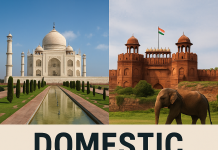With a holistic approach, corporate travel must prioritise sustainable business practices, driven by technological innovation, to meet shifting expectations in travel.
BY Janice Alyosius
The corporate travel industry has undergone significant changes since the pandemic, compelling it to adapt to evolving traveller expectations, rising costs, and the urgent need for sustainable practices. Corporates are struggling to navigate these critical challenges, particularly in managing cost and sustainability and leveraging technology. Given the scenario, it calls for effective corporate travel management that can provide a structured way to streamline the process. It can ensure sustainable practices while also keeping costs under control and achieving business goals.
Corporate leaders expressed their perspectives on these developments, highlighting both the challenges and opportunities ahead for corporate travel management and other allied goals.
Balancing cost and sustainability
Today, the most pressing challenge for corporate buyers is managing costs while promoting sustainable travel practices. Jasminder S. Brishan (Jassi), Professional Consultant, Onity Group Inc., explained, “As corporate buyers, we often look at the cost perspective, but the reality is that securing competitive corporate rates has become increasingly difficult.” After the pandemic, the resurgence of travel demand has led to higher occupancy rates at hotels, which in turn affects pricing. “Travellers are also more inclined to stick with brands they know and trust, making it challenging for us to diversify our options,” she added.
Despite these hurdles, sustainability should not take a back seat. Organisations must shift from luxury to necessary requirements and prioritise the long-term importance of sustainable travel to navigate cost-related issues. “It is essential for suppliers to demonstrate how sustainable choices can lead to cost savings. This could motivate corporate buyers to opt for greener hotel options,” Brishan suggested. By aligning financial incentives with sustainability, suppliers can encourage corporate clients to make choices that benefit both their business goals and the environment.
What are the setbacks?
Today, the industry is grappling with new challenges that have emerged post-pandemic. Greener travel options come with higher costs, hindering the widespread implementation of the sustainable travel practices. Nathumal Sharma, Deputy General Manager, Ultratech Cement, emphasised, “Navigating the post-pandemic landscape has been complex, particularly with travel restrictions and ensuring traveller’s safety. Rising travel costs and the integration of sustainable practices further complicate the situation.”
He further added that the National Tourism Organisations can play a pivotal role in attracting corporate travellers. By promoting their destinations as safe and business friendly, it can enhance the appeal. Additionally, tailored packages that include conference facilities and unique cultural experiences can attract corporate buyers.
Besides, the expectations of corporate travellers are rapidly changing as the travel landscape evolves. This rising expectation presents challenges for corporate buyers. Joyson Pinto, Senior Manager, Altimetrik, noted, “The market has changed significantly where hotel rates have increased by 30 to 50 per cent. Executives expect nothing less than five-star experiences, which come at a much higher price.”
This shift in expectations is coupled with a noticeable gap in service quality. Pinto pointed out that while prices have increased, suppliers have not enhanced their service levels to match. This disconnect presents a significant challenge for corporate travel managers who are tasked with ensuring they get value for their investments.
Cost management
Corporate travel is a major expense area for many business operations. It is important to create effective corporate travel management strategy to keep costs under control and avoid excessive spending. Outlining the importance of financial management in corporate travel management, Raghuram Mokshagundam, India People and Operations, Blankfactor India, said, “Typically, we start by consulting the finance team to establish budgets before planning any events. This approach is crucial in today’s climate, where managing costs effectively is pivotal than ever.”
Effective cost management needs a strategic approach to steer the complexities involved in corporate travel management. This will make it easier for companies to address the cost inefficiencies of unmanaged travel without overlooking comfort and safety.
Embracing innovations
As the corporate travellers continue to evolve, technology will play an increasingly significant role. The advancements in Artificial Intelligence (AI) and data analytics will redefine how businesses and travel partners operate. “The next big trend will likely involve using AI for personalised travel planning, real-time updates, and enhanced user experiences,” Sharma asserted. This technological shift is poised to create a more efficient and enjoyable travel experience for employees.
Asserting the critical role of technology in transforming corporate travel management, Gaurav Nagwekar, Head of Corporate Travel, Reliance Industries, expressed, “Since we digitised our travel processes in 2016, we have seen a significant shift in how we manage bookings.” His company is now transitioning to an Application Programming Interface (API) model that will enhance the booking experience through mobile apps—allowing travellers to book their journeys seamlessly.
Transitioning to digital transformation requires collaboration from all stakeholders to reap various benefits such as automating booking systems, negotiating rates and monitoring expenses. Nagwekar said that to achieve a comprehensive digital transformation, suppliers, be it airlines, travel management companies, or ground transportation vendors, must embrace automation. This shift is not merely about improving efficiency but also about enhancing travel experiences.
“Safety and security are pivotal, but travellers increasingly expect personalised experiences as well,” he added. Therefore, incorporating critical digital tools is crucial to deliver the right blend of value, safety, and personalised services.
Shift in incentive travel
Incentive travel has also undergone a significant transformation. Organisations are shifting their focus from traditional luxury trips to more meaningful and personalised experiences. Employees are looking for opportunities that promote wellness and offer unique cultural experiences. “Today’s incentive trips must provide flexibility and avenues for personal enrichment,” Sharma said This shift presents an opportunity for travel providers to rethink their offerings. Rather than simply catering to luxury expectations, suppliers should consider how to create experiences that resonate on a deeper level with corporate travellers.
Going Forward
The corporate travel industry finds itself at a critical threshold, facing rising costs, increasing traveller expectations, and a strong push for sustainability. As the corporates highlight, adapting to this new landscape demands innovative thinking, strategic planning, and a readiness to embrace technology. This complex milieu underscores the necessity for collaboration between corporate buyers and suppliers to navigate challenges effectively.
By prioritising sustainability, enhancing service quality, and fostering personalised experiences, the corporate travel sector can thrive in this rapidly changing setting. The future of corporate travel hinges on a collective commitment to excellence, ensuring that both companies and their employees can enjoy the benefits of travel while effectively addressing the challenges that lie ahead. It is time that all the stakeholders in the industry should come up with innovative and cost-effective solutions that not only enhances a traveller’s experience but also provides a sense of sustainable living.
Suppliers need to demonstrate how sustainable choices can lead to cost savings. This could motivate corporate buyers to opt for greener hotel options
Navigating the post-pandemic landscape has been complex. Rising travel costs and the integration of sustainable practices further complicate the situation.
Incorporating critical digital tools is crucial to deliver the right blend of value, safety, and personalised services
PEOPLE
Nathumal Sharma, Deputy General Manager, Ultratech Cement
Jasminder S. Brishan, Professional Consultant, Onity Group Inc.
Raghuram Mokshagundam, India People and Operations, Blankfactor India
Gaurav Nagwekar, Head of Corporate Travel, Reliance Industries















